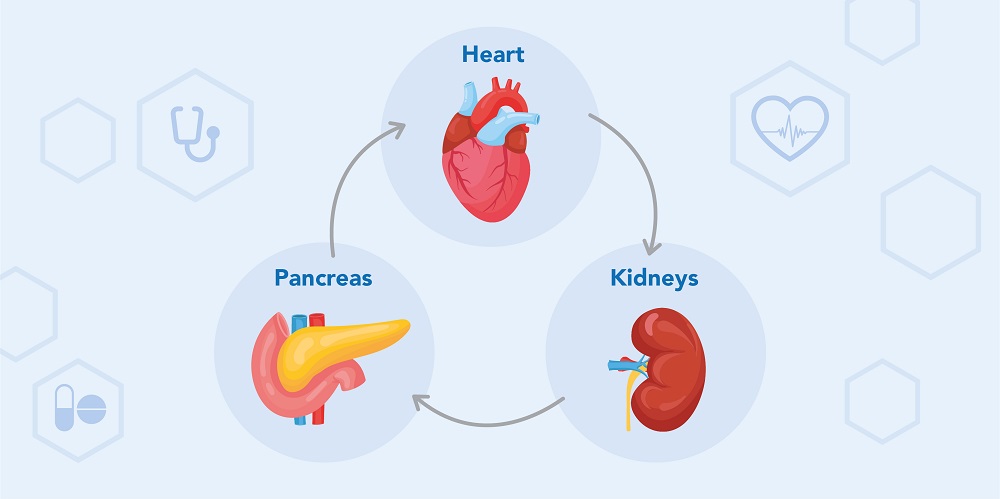Cardiovascular disease and CVRM
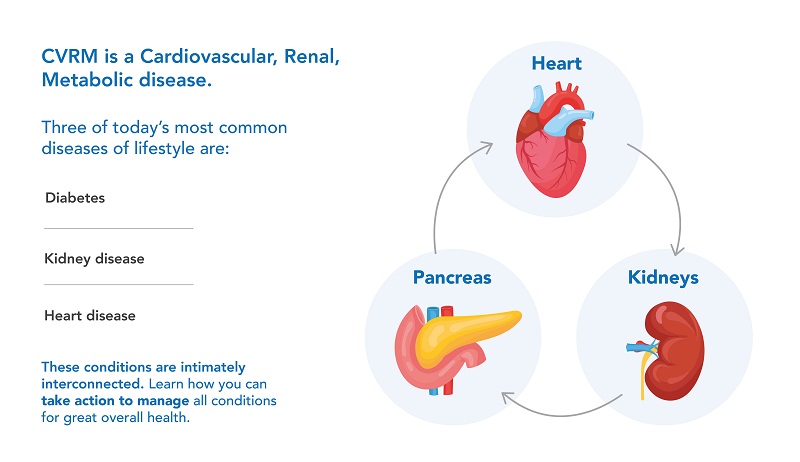
Cardiovascular disease is the leading cause of death globally. This impact becomes even greater when it co-occurs with kidney disease and diabetes – a disease cluster called “CVRM”. Learn how these conditions are interlinked and how best to combat them for great overall health.1
What is CVRM?
Each organ of the body performs a specific task, but also depends on the other organs to function well. When one part isn’t working properly, it places stress on the others, negatively affecting your health as a whole.
An important example of this interconnection is how the heart, kidneys and pancreas affect one another, and the corresponding links between cardiovascular disease, chronic kidney disease and Type 2 diabetes. Doctors are increasingly grouping these organ systems together to emphasise their interconnectivity, as “CVRM”:
CV: Cardiovascular – refers to the heart and blood vessels.
R: Renal – refers to the kidneys, which can develop chronic kidney disease (CKD). With CKD, the kidneys can’t properly perform their function of removing waste and toxins from the blood.
M: Metabolic refers to the pancreas, which produces enzymes and hormones, notably insulin, that help break down food and control blood sugar levels. Type 2 diabetes is the most common associated condition.4,5,6
What is cardiovascular disease?
Cardiovascular diseases are those affecting the cardiovascular system – the heart (“cardio”) and blood vessels (“vascular”) – which transports oxygen-rich blood around the body and removes waste products.2
Common cardiovascular diseases include:
- Coronary heart (coronary artery) disease: the coronary arteries, which supply the heart itself, become narrowed or blocked, reducing blood flow. This can cause heart attack (sudden lack of blood to the heart muscle) or heart failure (the heart can’t pump efficiently).
- Stroke: blood supply to the brain is blocked or reduced.
- Peripheral artery disease: blockage of arteries supplying the limbs.
- Arrhythmia: irregular heart rhythm, causing an abnormally fast or slow heartbeat.1,2,3
Causes and risk factors for cardiovascular disease
The following raise risk for cardiovascular disease:
- Diabetes. Poorly controlled high blood sugar can damage the blood vessels.
- Hypertension (high blood pressure) can damage arteries and weaken heart muscle.
- High cholesterol. Cholesterol is a key component of cells, but too much can cause atherosclerosis plaques.
- Smoking. Chemicals in tobacco smoke cause inflammation and swelling of the blood vessel lining.
- Sedentary lifestyle raises risk of diabetes, hypertension, high cholesterol, obesity and blood vessel blockages.
- Obesity raises risk for type 2 diabetes and hypertension.
- Unhealthy diet contributes to risk factors such as diabetes, hypertension and high cholesterol.
- Family history, especially a parent or sibling with cardiovascular disease.1,2,3,7
Symptoms of cardiovascular disease
The following raise risk for cardiovascular disease:
- Diabetes. Poorly controlled high blood sugar can damage the blood vessels.
- Hypertension (high blood pressure) can damage arteries and weaken heart muscle.
- High cholesterol. Cholesterol is a key component of cells, but too much can cause atherosclerosis plaques.
- Smoking. Chemicals in tobacco smoke cause inflammation and swelling of the blood vessel lining.
- Sedentary lifestyle raises risk of diabetes, hypertension, high cholesterol, obesity and blood vessel blockages.
- Obesity raises risk for type 2 diabetes and hypertension.
- Unhealthy diet contributes to risk factors such as diabetes, hypertension and high cholesterol.
- Family history, especially a parent or sibling with cardiovascular disease.1,2,3,7

Diagnosis of cardiovascular disease
Your doctor will review your medical and family history for cardiovascular disease risk factors.
Diagnostic tests may include:
- Blood tests to check for abnormal levels of blood sugar, cholesterol and fats.
- Electrocardiogram (EKG/ECG) to measure electrical signals in the heart.
- Stress test on a treadmill to gauge heart function during exercise.
- Imaging testsg. chest X-ray, CT (Computed Tomography) scan, MRI (Magnetic Resonance Imaging,) echocardiography – these check for damage, low blood supply and atherosclerosis.
- Coronary angiography and cardiac catheterisation: used when indicated, to detect blockages. A dye is injected into the heart and coronary arteries, and a thin tube is guided to the heart via a blood vessel.7,8
Treatment for cardiovascular disease
Treatment depends on the type of cardiovascular disease. It may include:
- Lifestyle changes centered on heart-healthy eating and exercise.
- Medication. You may be prescribed several medicines to address different cardiovascular issues. For example, statins lower blood cholesterol; aspirin lowers blood clotting risk; angiotensin-converting enzyme (ACE) inhibitors and angiotensin-2 receptor blockers (ARBs) widen blood vessels, improving blood flow and reducing blood pressure. Newer classes of diabetes drugs, glucagon-like peptide-1 receptor agonists (GLP-1 RAs), and sodium-glucose co-transporter-2 inhibitors (SLGT2) are helpful for weight loss.
Surgery, for example:
- Balloon angioplasty: a small balloon-like device is threaded through a blocked artery to open it.
- A stent: a tiny mesh coil, is usually placed to keep the artery open.
- Coronary artery bypass: a section of healthy blood vessel is used to bypass a blocked coronary artery.
- Heart valve repair or replacement.
- Cardiac rehabilitation: a recovery programme after a major cardiovascular event or it typically includes physical therapy, guidance on medication adherence and lifestyle, and psychological counselling.1,2,3,8
Links between cardiovascular disease and kidney disease
The kidneys filter waste products and excess water from the blood, which the cardiovascular system transports throughout the body (including back into the kidneys).
When the kidneys aren’t working properly, blood composition and volume changes, making the heart work harder to pump it around your body, and putting pressure on the blood vessels. Raised pressure on the blood vessels can in turn damage your kidneys, limiting their blood-filtering capacity and leading to CKD.3,9
Take action for your health
Good lifestyle management helps lower risk for cardiovascular conditions, and for further damage if you have been diagnosed. These actions also protect against kidney disease and diabetes:
- Follow a heart-healthy diet rich in fruit, vegetables and lean protein; and low in processed food, sugar and salt.
- Swap refined carbs (white bread, pasta, sugary cereals) for whole grains.
- Steam, boil, grill or air-fry with a little vegetable oil instead of frying in animal fat.
- Replace high-salt condiments with herbs, spices, citrus.
- Regular exercise. Gradually aim for minimum 150 minutes cardio weekly, plus bi-weekly strength training.
- Walk whenever possible: take the stairs; stride to the corner store.
- Do household chores like mopping or gardening vigorously.
- Don’t smoke. One year post-quitting, your coronary heart disease risk is half that of a smoker’s.
- Drink less. Excessive alcohol raises blood pressure.
- Take medications exactly as prescribed so they work effectively.
- Check in regularly with your doctors for monitoring and guidance.
- Don’t neglect your mental health. A cardiovascular disease diagnosis may feel initially overwhelming, so find a therapist if you’re feeling low or anxious. Get support from friends and family, and consider joining a patient support group or online community. The Heart and Stroke Foundation of South Africa https://www.heartfoundation.co.za/ is a great place to start.10,11,12
Related Brochures
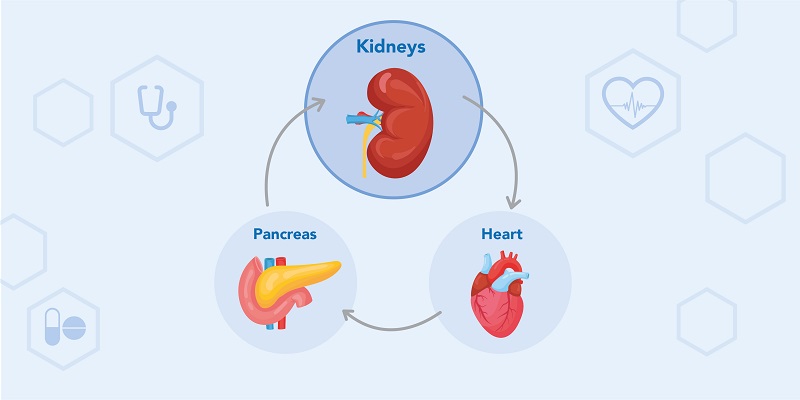
chronic-kidney-disease-and-cvrm
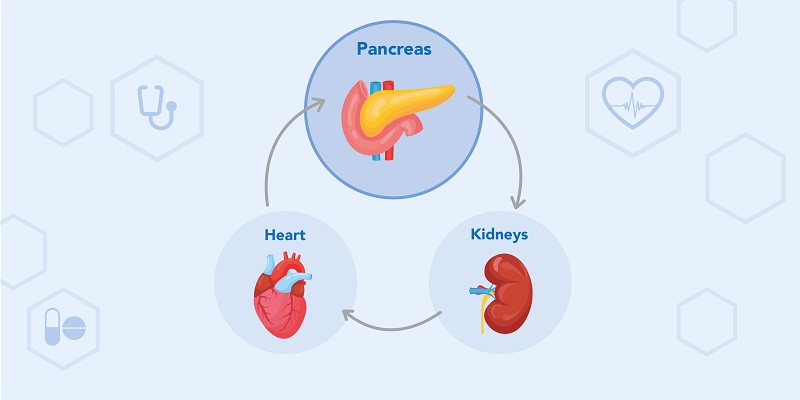
diabetes-type-2-and-cvrm
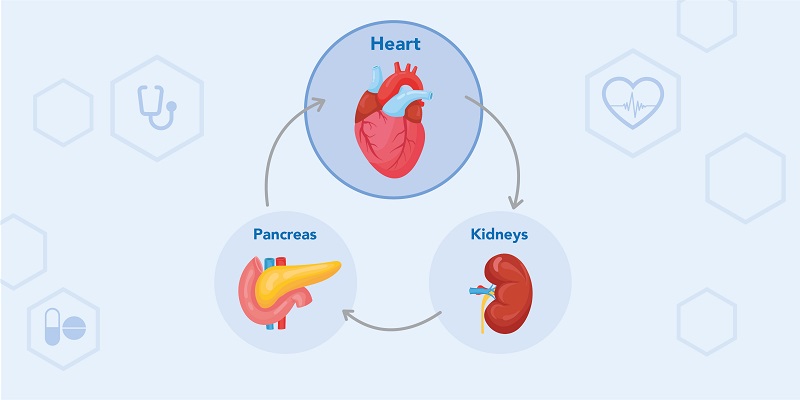
heart-failure-and-the-cardiovascular-renal-metabolism-cvrm-cluste
